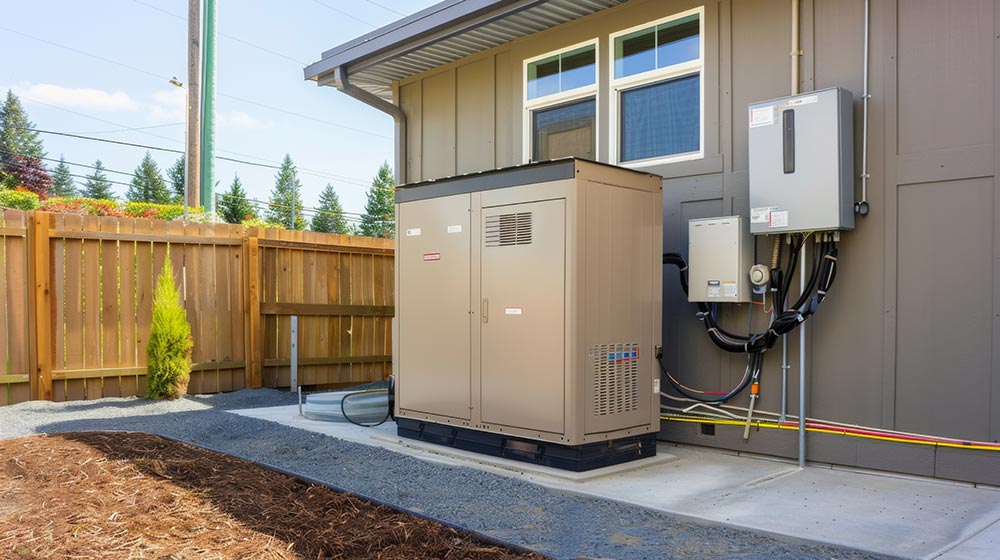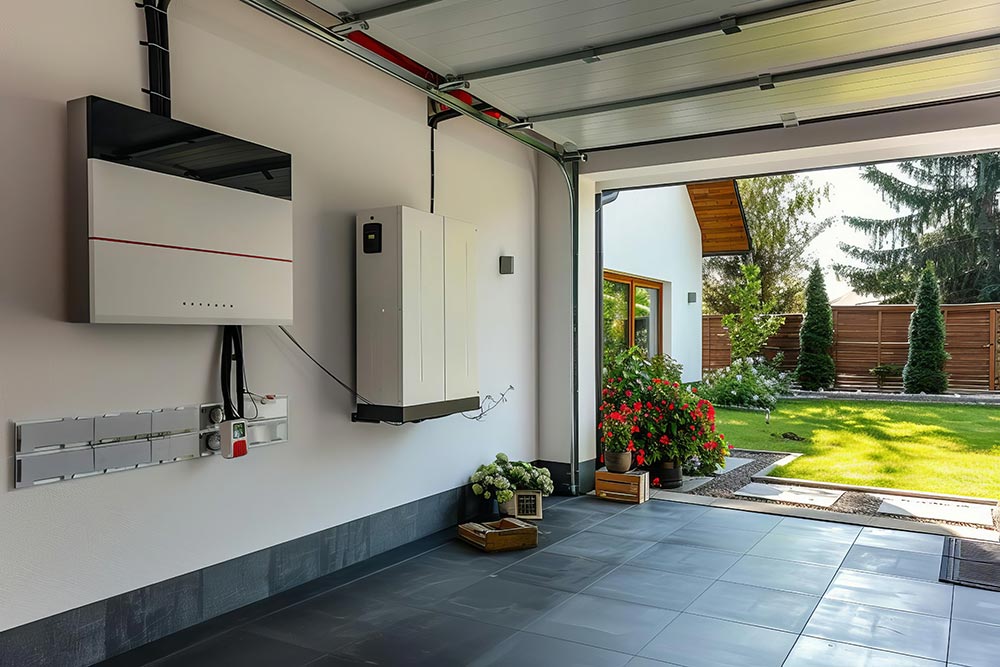One of the biggest misconceptions people have about solar panels is that they’ll keep your home running when the utility power goes out. But contrary to public belief, they can’t send electricity to your home when the power grid goes down (primarily due to safety). Grid-tied solar panels send electricity to the utility lines. If they’re not shut off during an outage, they would continue to send electricity, which would threaten the utility workers fixing the lines. So, to keep them from getting injured or even killed, your solar panels will go out when the grid does. If you want your lights to stay on during an outage, you’ll need to have a backup plan. Homes with solar panels can be connected to a backup generator or a battery, but how it works can be a little tricky.
How Backup Generators Work
Often referred to as “standby generators,” these units can generate backup power to your entire home for long periods of time. Some of the popular manufacturers for these types of generators include:
- Generac. (our preferred brand)
- Kohler.
- Cummins.
The generator’s Automatic Transfer Switch (ATS) can detect a power outage and will immediately switch your home’s power source from the grid to the generator. There are many types of whole-house generators, and they run on different types of fuel (including gasoline, natural gas, diesel, and propane).

How Solar Panels and Generators Work Together
Even if you have a backup generator, your solar panels aren’t going to turn on when the grid is down. So, you won’t be able to run your home with both at the same time. Solar panels can send dangerous feedback to the grid, which can create a hazardous situation for utility workers. They would also send feedback to the generator, which can damage either system (or even both). Also, the energy generators produce isn’t strong enough to boot up most solar inverters.
Just because neither system can work together, it doesn’t mean you can’t have a backup generator if you have solar panels. Many homes have both. They do, however, need to be wired properly so the two systems won’t interfere with each other. A solar installer or certified electrician will be able to determine the best and safest way to approach it.
Backup Power Options for Homes with Solar Panels
If you have solar panels and want to have backup power for your home, you have two options. Both will power up your home when there’s an outage, but there are some important differences between the two. Having a generator with solar panels will work the same way as any standby generator. It will automatically turn on when the grid is down and will provide backup power for your home.
Some generators are large enough to power your entire home, which is why they’re often referred to as “whole-house generators.” But other generators will only give you enough to power certain appliances (such as your refrigerator). They also rely on some type of fuel, such as propane or natural gas, for power. So, they’re not as environmentally friendly as solar batteries. They will, however, give you reliable backup power for your home and give you an extra layer of energy security.
Solar panel battery storage will let you save any excess electricity being generated by your solar panels during the day when there’s plenty of sunshine. This stored energy can be used to power your home at night when the sun isn’t out, during a power outage, or just to avoid peak demand charging periods. The amount of backup power your solar battery provides will depend on the size of the system you install. The more storage you install, the longer your backup power supply will last.
Solar batteries run entirely on solar energy, so you can have backup power without having to burn fossil fuels. If you can switch to off-grid mode, your solar panels will be able to stay on during a power outage. But if your system has battery storage, it can temporarily disconnect from the grid during an outage so you can continue to generate power and recharge your batteries during the day.

The main difference between a battery and a generator
When comparing generators to battery storage as backup solutions, both offer unique advantages depending on your energy needs. Generators, typically powered by gas or diesel, provide continuous power for extended outages and are well-suited for homes or businesses requiring large amounts of energy. However, they can be noisy, require regular maintenance, and depend on fuel availability. On the other hand, battery storage systems, which often pair with solar panels, offer a quieter, cleaner, and more environmentally friendly solution. Though batteries have a limited storage capacity, they provide seamless, instant power during short outages and are ideal for reducing energy costs through load shifting. So, if you are looking for disaster preparedness with the ability to generate whole home power for extended periods, a generator is probably your best option. If you are looking for shorter term backup to deal with stormy days, usage spikes, brownouts, overnight usage, or other shorter term electricity interruptions, a battery is probably your best option. In a perfect world, we might like both, generators for emergency long term backup, and a battery for short term fluctuations and overnight use with solar panels.
If you’re looking for one of the best places for backup generators in Corpus Christi, be sure to reach out to Solar Power Integrator. We have an experienced team who would be happy to speak with you!
